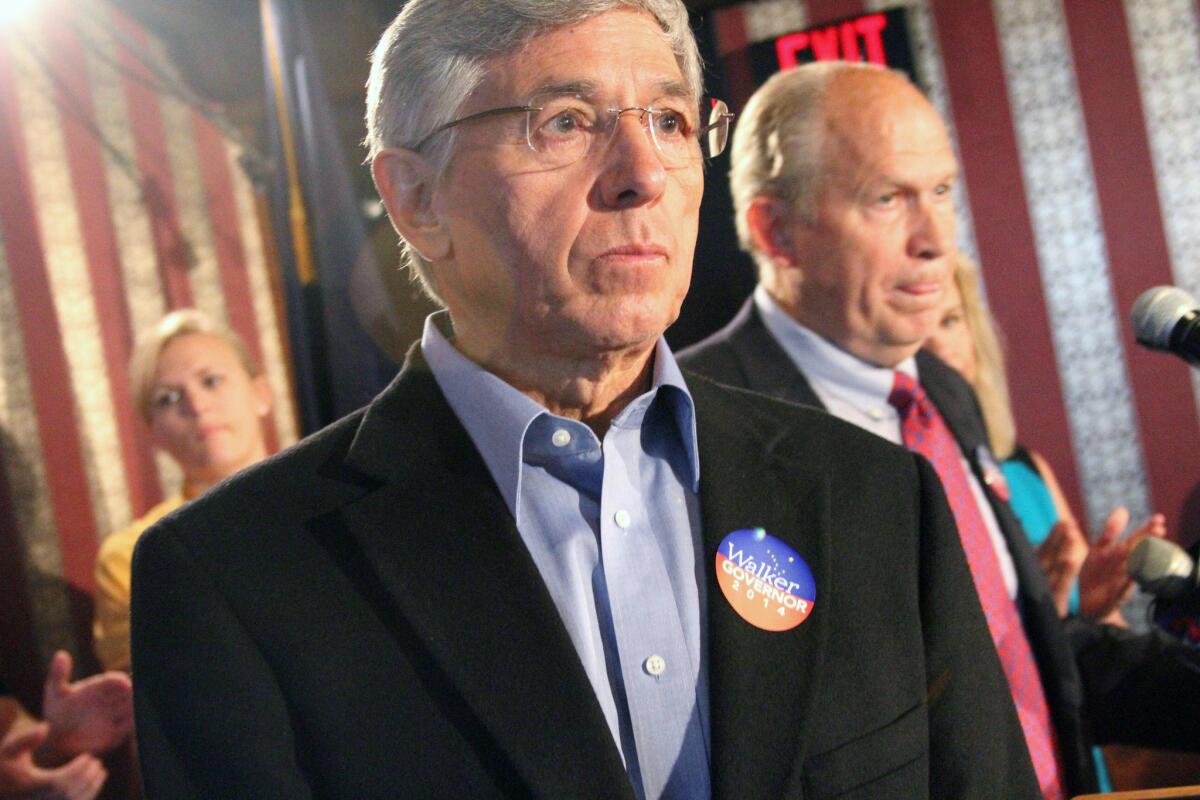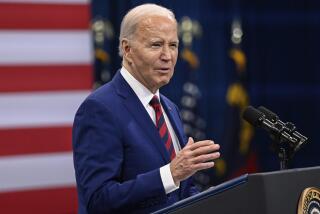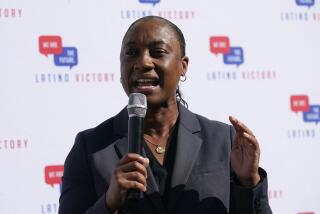Q&A: Bill Walker: Unity ticket in Alaska governor’s race ‘unprecedented’

Bill Walker, Alaska’s Republican-turned-independent candidate for governor, and Byron Mallott, who won the state’s Democratic primary, were set to take on incumbent Gov. Sean Parnell, a Republican, for the opportunity to run the 49th state. Alone, they couldn’t win. So they decided to throw their lot together in a unity ticket, and now they’re ahead in the polls. Walker sat down last week in his Anchorage law office, with its pristine view of the storied Cook Inlet, and talked about the dynamics of the race and the two men’s decision to do something that had never been done before in the Last Frontier. His remarks are edited for length.
------------
FOR THE RECORD
10:33 a.m. PDT: An earlier version of this post referred to Alaska as the 50th state. Alaska joined the union in January 1959 as the 49th state. Hawaii followed as the 50th state seven months later.
------------
You ran for governor once before, also against Sean Parnell. What’s different this time?
In 2010, [former] Gov. [Wally] Hickel came to me and said, ‘You run, and I’ll support you all the way. But you run as an independent, not a Republican. You’re not going to get through that closed Republican primary.’ I didn’t agree with him. He was right. I was wrong. Now when Mrs. Hickel sees me, she always waves her finger at me in the stores. ‘Wally told you to run independent.’
I say I was playing checkers then, and now I’m playing chess. A whole lot more strategy, a whole lot more ground school this time.
Alaska is notoriously hard to poll, since so many people live off the grid, off the road system. But what polling has been done shows you pretty consistently ahead of Parnell.
We’ve had pretty strong momentum since the blending together. I think it was kind of a pause initially, ‘Hm, how’s that gonna work?’ And then people went, ‘Oh, my gosh, that’d work phenomenal.’
I got a text from somebody today: ‘Rasmussen poll out. You’re up 9,’ or something like that.
So it’s been consistently, 2, 4, 5, 8, 9, always on the top though. It varies on what degree. Nine is probably the biggest lead we had to date.
Before the primary though, Parnell was ahead, wasn’t he?
I’ve been doing a lot of polling, internal polling and watching different polls. And as we got close to the primary, that I was not in, I continued to build, continued to build. I was doing three-way polls. Parnell would be first, I was second, and Byron was third.
But then I did do a head-to-head poll. And I did it right after the primary. And I was up like 4% on a head-to-head with Parnell. That told me that Alaskans wanted a new governor.
How much of your momentum is related to the sex abuse scandal in the Alaska National Guard, of which Parnell is commander in chief?
I’ve been pretty outspoken about that. I’ve written an op-ed or two about the Guard, critical of the governor. But we’ve had pretty strong momentum since the blending together.
Is the National Guard scandal -- the reports of women in the Guard raped by their fellow Guard members, allegations of fraud, the ignoring of problems by people high in the command structure -- the biggest scandal in Alaska history?
When I look at the magnitude of what happened, it’s hard to come up with anything else. You compare that to the bribes on the oil tax, to change the oil tax, those kinds of things, where 10% of our legislature was arrested, that was a pretty big deal. But that had to do with money. You can always put back together the pocketbook stuff. But when peoples’ lives are destroyed, it’s pretty tough.
Mallott had already won the Democratic primary when the two of you decided to get together and take on Parnell. It surprises me that someone running as top dog would be willing to suck it in and run as No. 2. What was his rationale?
He gets that question a lot, and I’m there when he gets that question, so I don’t want to speak on his behalf. But what he has said is that he looked at the polls. He looked at how long I had been running. And me moving over running as a Democrat would do nothing in the way of changing anything. Me running in the No. 2 spot would change nothing. It was clear from the polls that I was the one who could beat Parnell. That’s how he made that connection.
What did Mallott need to make this happen?He didn’t want the [Democratic] Party to release him. He wanted the party to come with him. That was a pretty big mountain for that to happen. Unprecedented in the history of our state, unprecedented that somebody would move, a named candidate who just won the primary, in the Democratic primary and moving over and be running with an independent. We got together, the groups got together.
We didn’t actually know what was going to happen. The deadline was 4:30 on Tuesday when we had to submit all of our documentation, the day after Labor Day. And on Monday at about noon it was clear that we had found a path forward. The legal team had given a green light that that was going to work. Then we needed to put together the whole rollout. It was pretty moving to be part of that.
The Democrats agreed to let your unity ticket go forward. Why did the Republicans push back?
There wasn’t much attention paid to what we were doing until the first poll came out. I think the first poll showed us, we were 6 or 8 points up. The next day a lawsuit was filed by the Republican Party leadership to undo what we had done. The rationale was that we had disenfranchised the Democrat voters, which was an interesting argument for the Republicans to be making. But it was overwhelmingly endorsed by the Democratic Party.
You won the lawsuit. Why do you think you have a chance to win the election?
People are seeing an opportunity to have a more collaborative administration. When we fought for statehood, we didn’t do that as partisan Alaska; we did that as Alaskans. After the earthquake of ‘64, we rebuilt the state as Alaskans. Floods, all sorts of things that have happened to us, we’re our best when we’re just pulling on the same end of the rope. And so that’s what we’re saying, we’re going to reach out.
Follow @marialaganga for national news
More to Read
Start your day right
Sign up for Essential California for news, features and recommendations from the L.A. Times and beyond in your inbox six days a week.
You may occasionally receive promotional content from the Los Angeles Times.







